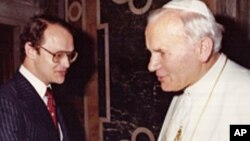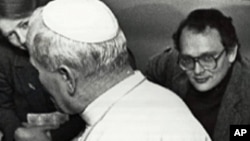Jack Payton, executive editor of VOA’s principal English-language web site, www.voanews.com, has died at the age of 69.
Payton suffered an apparent heart attack while at a movie theater with his wife Sharrie on Friday (Oct. 4). He had served with the web site since 2012 after a 45-year career in print and broadcasting that took him around the world and included many of the biggest stories of his time. He had held a number of senior positions since joining VOA’s news division in 1999.
VOA Director David Ensor lamented his passing as a huge loss for the Voice of America and his many friends in the agency. "He has left behind a legacy of young people who learned their trade at his side and will carry forward his high standards of journalism."
VOA reporters and editors expressed their personal shock and sadness in a wave of heartfelt messages, with many remembering Payton as a mentor whose advice and guidance helped shape their careers.
"Jack was an old fashioned newsman in the classic sense," said VOA National Correspondent Jim Malone. "He had that perpetual curiosity and an appreciation for a good story. As an editor, Jack made all of us better writers. He was one of those people who brought out the best in his co-workers."
Payton was born and educated in New Orleans. After earning a degree in English literature and philosophy at Tulane University, he began his career in journalism there with United Press International.
The wire service brought him from New Orleans to its New York headquarters in 1972, and onward to Europe a few months later. Based in Brussels in 1973, Payton traveled widely in drought-stricken West Africa. Later that year he was appointed bureau chief for Israel, arriving just a month before the Middle East war that broke out on October 6, 1973.
Payton became UPI's manager for Italy in 1976, and from his base in Rome covered stories that dominated the world’s attention over the next seven years, including the rise of Red Brigades terrorism in Italy, and Pope John Paul II’s travels to Africa, Asia, Europe and North America. He reported from Israel and Lebanon when fighting broke out in 1978 and again in 1982, when Israeli forces invaded Lebanon and advanced into Beirut.
Payton left UPI as its foreign editor in Washington to join the St. Petersburg Times newspaper in Florida in 1985. He supervised a network of foreign correspondents and reported from capitals around the world, including Saudi Arabia and Kuwait during the first Gulf War in 1991.
Those experiences informed Payton's decisions when he joined the Voice of America in 1999 as an assignments editor, responsible for discussing and arranging news coverage with foreign and domestic correspondents and reporters.
Co-workers praised Payton’s skills as an editor and mentor, and the lifelong passion for journalism that was evident throughout his career. As VOA Europe Correspondent Al Pessin said, “He had the ability to help you do your job and let you do your job at the same time.”
Veteran VOA correspondent André DeNesnera became news director of the U.S.-funded broadcast network soon after Payton arrived, and the two became close friends. DeNesnera noted that Payton keenly understood the need for objectivity and balance in all news reports, and was the strongest advocate of the VOA Charter, which requires its staff to sustain those values. DeNesnera said Payton defended VOA journalists and their stories, “whether or not [they] ruffled feathers anywhere up or down the line.”
Payton is survived by his wife Sharrie, his mother and two sisters.
Payton suffered an apparent heart attack while at a movie theater with his wife Sharrie on Friday (Oct. 4). He had served with the web site since 2012 after a 45-year career in print and broadcasting that took him around the world and included many of the biggest stories of his time. He had held a number of senior positions since joining VOA’s news division in 1999.
VOA Director David Ensor lamented his passing as a huge loss for the Voice of America and his many friends in the agency. "He has left behind a legacy of young people who learned their trade at his side and will carry forward his high standards of journalism."
VOA reporters and editors expressed their personal shock and sadness in a wave of heartfelt messages, with many remembering Payton as a mentor whose advice and guidance helped shape their careers.
"Jack was an old fashioned newsman in the classic sense," said VOA National Correspondent Jim Malone. "He had that perpetual curiosity and an appreciation for a good story. As an editor, Jack made all of us better writers. He was one of those people who brought out the best in his co-workers."
Payton was born and educated in New Orleans. After earning a degree in English literature and philosophy at Tulane University, he began his career in journalism there with United Press International.
The wire service brought him from New Orleans to its New York headquarters in 1972, and onward to Europe a few months later. Based in Brussels in 1973, Payton traveled widely in drought-stricken West Africa. Later that year he was appointed bureau chief for Israel, arriving just a month before the Middle East war that broke out on October 6, 1973.
Payton became UPI's manager for Italy in 1976, and from his base in Rome covered stories that dominated the world’s attention over the next seven years, including the rise of Red Brigades terrorism in Italy, and Pope John Paul II’s travels to Africa, Asia, Europe and North America. He reported from Israel and Lebanon when fighting broke out in 1978 and again in 1982, when Israeli forces invaded Lebanon and advanced into Beirut.
Payton left UPI as its foreign editor in Washington to join the St. Petersburg Times newspaper in Florida in 1985. He supervised a network of foreign correspondents and reported from capitals around the world, including Saudi Arabia and Kuwait during the first Gulf War in 1991.
Those experiences informed Payton's decisions when he joined the Voice of America in 1999 as an assignments editor, responsible for discussing and arranging news coverage with foreign and domestic correspondents and reporters.
Co-workers praised Payton’s skills as an editor and mentor, and the lifelong passion for journalism that was evident throughout his career. As VOA Europe Correspondent Al Pessin said, “He had the ability to help you do your job and let you do your job at the same time.”
Veteran VOA correspondent André DeNesnera became news director of the U.S.-funded broadcast network soon after Payton arrived, and the two became close friends. DeNesnera noted that Payton keenly understood the need for objectivity and balance in all news reports, and was the strongest advocate of the VOA Charter, which requires its staff to sustain those values. DeNesnera said Payton defended VOA journalists and their stories, “whether or not [they] ruffled feathers anywhere up or down the line.”
Payton is survived by his wife Sharrie, his mother and two sisters.





